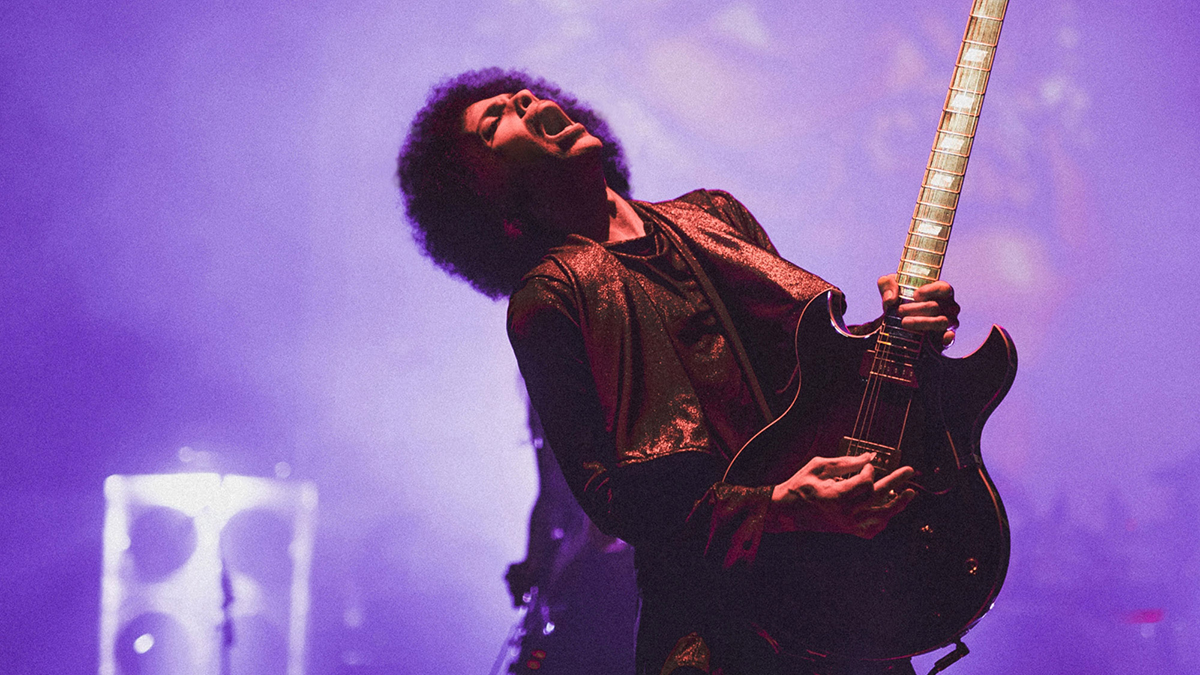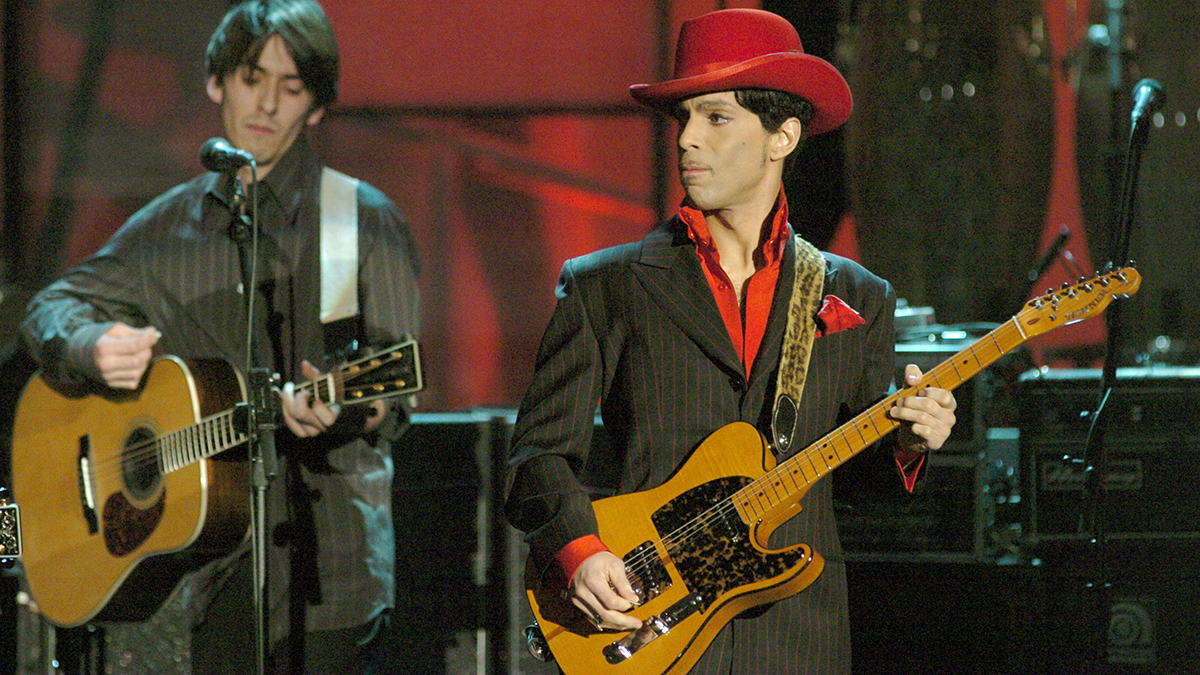“Then on-air, is where it gets nuts”: How Prince’s final, legendary guitar performance on SNL was saved by a quick-thinking audio engineer
Best of 2024: His 8-minute medley from 2014 is considered one of the greatest musical spots in the show’s history

Join us for our traditional look back at the news and features that floated your boat this year.
Best of 2024: Prince’s late-career albums may have been patchy, but as a live performer, he appeared to be going from strength to strength.
Take his 8-minute medley with 3rdeyegirl on Saturday Night Live in 2014, for example, broadcast less than 18 months before his death and what would turn out to be his final appearance on the show. Prince was performing in support of his two new albums - Art Official Age and Plectrumelectrum - both of which had received mixed reviews. Played live, though, their songs came alive.
Kicking off with Art Official Age’s Clouds - and with Lianne La Havas joining him on lead vocals - Prince then left his keyboard, picked up his guitar and segued into Marz and Anotherlove, full-throated rock songs from Plectrumelectrum.
The 1 November performance - played with fellow 3rdeyegirl members Hannah Welton (drums), Donna Grantis (guitars) and Ida Kristine Nielsen (bass) - was quickly hailed as “unprecedented” and “mind-blowing” by Rolling Stone, and is considered one of the greatest in SNL’s history.
Things could have been very different, though, if it hadn’t been for quick-thinking engineer Josiah Gluck, who was working that night and in the lead-up to the performance.
Earlier this month, Gluck reminisced about his career on SNL at an event being held at Audio-Technica’s new “engagement space” in New York. He sat down for a 90-minute interview with Audio-Technica artist relations manager Roxanne Ricks, and Mix Online was there to hear what he had to say.
Gluck admits that the show in question was “a little nerve-wracking because it’s Prince!” and, sure enough, his demands turned out to be pretty specific. After some discussion about the details of his monitor mix, Prince rocked up on the Saturday and wanted to talk about his guitar tone.
Want all the hottest music and gear news, reviews, deals, features and more, direct to your inbox? Sign up here.
“Prince comes in to listen in the mix room because he hadn’t come in on Thursday,” Gluck recalls. “He has a very firm handshake and he’s cordial, but all business. As we’re listening, Prince turns to his mixer who he’s working with and asks, ‘Where are the doublers on the guitar?’ His mixer replies, ‘We don’t use doublers on the guitar.’ And Prince says, ‘Oh, yeah, we do; we do have doublers on the guitar.’”
Switching into problem-solving mode, Gluck says that he had an inkling of what Prince was talking about and a way to give him what he wanted.
“Earlier, we had been listening to a rehearsal recording from Paisley Park, and I think what Prince had fallen in love with was the slapback coming into the mics from the big room,” he recalls. “So I say, ‘Well, I have this vocal doubling effect.’ I toss it on, and he’s like, ‘Yeah, that’s good; that’s fine. Let’s do that.’”
Next up, the distortion: “Then he’s asking me, ‘Can we get these guitars crunchy?’” says Gluck. “I know he wants me to overdrive an analogue preamp, but I can’t do that - I’m at a digital console, so it would just crap out. And then he wants the snare drum really dark, but I ask, ‘Could you meet me halfway?’ as it’s getting too boxy, and he says, ‘Yeah, do what you’ve gotta do.’”
With air time getting closer, Gluck remembers that he was then called away by his boss to do a run-through of the show’s opening montage and monologue, but wanted some reassurance from Prince that he was happy with his guitar tone.
So I ask Prince, ‘Well, are we cool here? Because, honestly, I think we’re gonna singe all living matter within a quarter-mile radius of this place tonight.’
Josiah Gluck
“I say to Prince, ‘I’m really sorry, man, but I gotta do this other thing,” says Gluck. “He says, ‘No, it’s OK - ya gotta listen to [SNL musical director] Lenny Pickett!’ So I ask, ‘Well, are we cool here? Because, honestly, I think we’re gonna singe all living matter within a quarter-mile radius of this place tonight.’ And he starts laughing! ‘Yeah, that’s cool. I like that - all living matter, yeah!’ I consider that one of my greatest career achievements: getting Prince to laugh!”
If dealing with Prince pre-show was daunting, though, Gluck says that it was during the performance itself - which was being broadcast live and introduced by Chris Rock with the words "ladies and gentlemen, you are so lucky tonight!" - that things really got scary.
“Then on-air, is where it gets nuts,” says Gluck. “The plan is he starts camera right on a keyboard, and then walks to centre stage and picks up his guitar. Right before we start, I hear over the PL [Private Line]: ‘He’s going to plug in his guitar when he gets to centre stage. Don’t open up the guitar yet.’ I’m like, OK, fine.’
“When he walks over and picks up the guitar, I open up the fader - and I don’t hear guitar! I’m trying not to freak out. ‘Where’s the guitar?’ And then I hear over the PL, ‘He didn’t plug in! He didn’t plug in!’”
It goes without saying that an unplugged guitar wouldn’t have “singed” anything, so Gluck had to think on his feet and wait and see what Prince was going to do next.
“I whip the fader down, and I’m watching and listening,” he says. “You see him give a knowing look, plug in, and start to play. Then - and this is taking more time to discuss than it actually took in my head - I try to figure out where he is musically so that he doesn’t just cut in.”

Fortunately, Gluck’s quick thinking saved the day, and when you watch the performance, Prince’s switch from keyboards to guitar sounds seamless. Gluck says that he uses this story to illustrate why it’s still important to have a human in charge of a live mixing environment rather than an AI solution.
“I don’t know if AI can accurately say, ‘Oh, he’s not playing. Let me bring this down. Let me listen to where we are in the music. Let me call on my vast nanoseconds of experience and see when I think I can open this fader up.’” he suggests.
“This one moment with Prince right there is an example of where experience, keeping your head on and not freaking out will get you through it.”

I’m the Deputy Editor of MusicRadar, having worked on the site since its launch in 2007. I previously spent eight years working on our sister magazine, Computer Music. I’ve been playing the piano, gigging in bands and failing to finish tracks at home for more than 30 years, 24 of which I’ve also spent writing about music and the ever-changing technology used to make it.